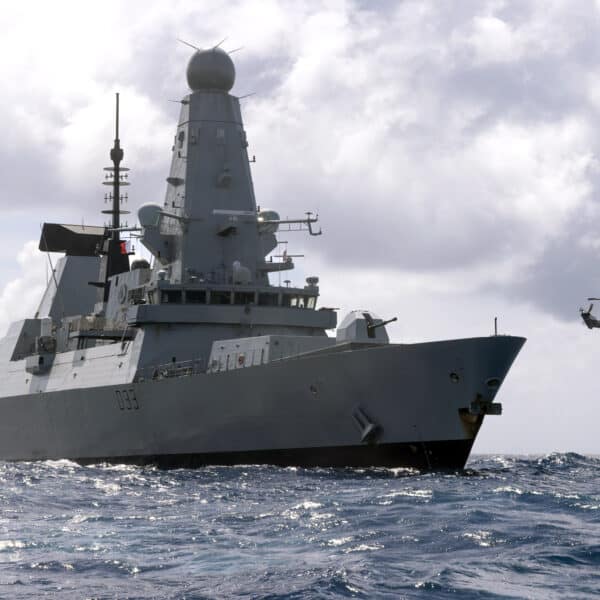13 11月 2023
Electronic warfare programme for Royal Navy warships achieves major milestone

Pictured: HMS DAUNTLESS and a Wildcat from 815 Naval Air Squadron. In the middle of the Caribbean, a wildcat from 815 Naval Air Squadron launched from HMS DAUNTLESS conducted a gunnery exercise with the Royal Marine Sniper Team onboard. HMS DAUNTLESS is patrolling the Caribbean to counter illicit activities, in particular working with the US Coast Guard and other law enforcement agencies in the ongoing fight against drug trafficking in the region. HMS DAUNTLESS has been working in the North Atlantic and Caribbean region and during operation APT(N). The ship and UK are committed to maintaining a constant presence in the North Atlantic and Caribbean, to provide security and reassure British Overseas Territories. The ship is ready to support. Assisting the Foreign, Commonwealth, and Development Office and Humanitarian Aid and/or Disaster Relief during the annual Core Hurricane Season.
A new electro-magnetic warfare system that will enhance Royal Navy warships has passed a major milestone.
The critical design review (CDR) for the Maritime Electronic Warfare System Integrated Capability (MEWSIC) has been approved, meaning it can now proceed into manufacture, testing and acceptance.
Part of the Royal Navy’s Maritime Electronic Warfare Programme (MEWP), which will provide an enhanced defensive capability against Anti-Ship Missiles, MEWSIC increment 1 is managed by Defence Equipment & Support and being developed by prime contractor Babcock in conjunction with Elbit Systems UK.
Once operational, MEWSIC will allow for increased detection and identification of radar signals over a greater range than currently possible. This will aid faster operational decision-making, enhanced situational awareness and improved ship protection.
Cdre Matt Stratton, Deputy Director of Naval Equipment System Acquisition, said: “The Royal Navy has invested in an ambitious programme to deliver modern electronic warfare capabilities to its surface warships that will allow them to maintain the UK’s commitments around the world.
“Achieving the Critical Design Review milestone is visible confirmation of the Royal Navy’s, DE&S’, Babcock’s and Elbit System UK’s intent to deliver on that promise.”
MEWSIC will see the next generation of Radar Electronic Support Measure (RESM) and EW Command and Control (EWC2) equipment being installed on Type 45 destroyers, Queen Elizabeth aircraft carriers, and the Type 26 and Type 31 frigates being built at Govan and Rosyth shipyards, respectively, in Scotland.
The £100 million, 13-year contract awarded to the industry consortium in 2021 is supporting around 170 jobs and also includes on-shore facilities delivering training, trials and acceptance.
Cdre Phil Game, DE&S’ Head of Maritime Combat Systems, said: “Completion of the Critical Design process is the culmination of several months of collaborative effort between UK MOD and industry teams to mature and refine the MEWSIC solution.
“It gives MOD, and the Navy in particular, a high level of confidence that we are on track to deliver the highly capable system required to protect the fleet from both current and future threats.
“I am also pleased to see the significant investment being made both in UK infrastructure and technology transfer, to secure the long-term sustainability of this critical capability.”
Babcock and Elbit Systems UK have both invested significantly in their people and infrastructure, helping to deliver UK prosperity by generating and sustaining new high-value technology engineering jobs across the UK.
The multi-disciplinary MEWSIC team includes engineers and project managers from Babcock collaborating with Elbit Systems UK’s employees at its new assembly, integration and test facility in Bristol.
Neal Misell, Chief Executive of Babcock’s Missions Systems business, said: “Our dedicated team is playing a central role in taking a next-generation electromagnetic warfare solution from concept to installation – and we are pleased to have achieved this significant milestone.”
Martin Fausset, CEO Elbit Systems UK, said: “We are immensely proud to have achieved this milestone, to have created a number of high-tech jobs, and to have established a UK EW capability for the Royal Navy, and look forward to the next phase of this project.”